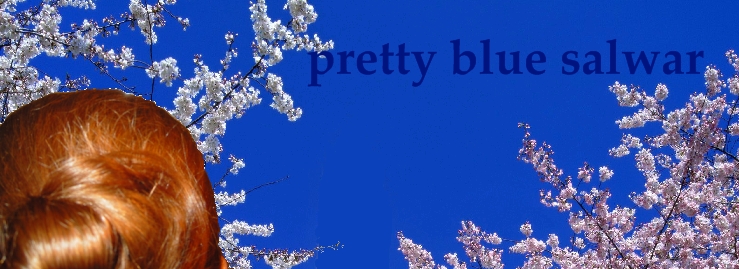I've started sitting in on another course. This time, I aimed towards the English department, because I figured I had good odds of the course being taught... um... in English. ^__^ (I sat in on a Bharatanatyam course for a few weeks, but the entire instruction was in Telugu and it became difficult to follow.)
I picked "Indian Writers in English" because I thought I might get lucky and find the class discussing a text I had read (or, at least, read about).
I'm going to continue to watch this course for a while. It was very interesting. The discussion, when I sat in, was about whether Indian writers who chose to write in English were being "authentic." Was their choice of English, for example, a strategic move to break into an international market? Or was it a betrayal of their roots and an indication of continued slavishness towards their former colonial masters? Could an Indian writer communicate effectively about the Indian experience in a "non-native" language?
The professor didn't reach a "conclusion" to his line of questioning; instead he left it open-ended for the class to ponder, with the intention of discussing the issue further as the semester progresses.
But he did leave out one argument which puzzled me by its absence.
That is, he left out the fact that for many Indian writers (esp. the "big name" ones), English is in fact their mother tongue; or, perhaps, a shared mother tongue along with Hindi or Bengali or another Indian language. Gurcharan Das and Mahesh Dattani both write about this in the preface to their plays. I can't quote them directly because I don't have the texts with me, but the arguments are thus: "How can we be accused of using a non-native language when we have been speaking English from birth?" Das in particular argues that he writes in both English and Hindi, and that some of his essays and plays can only be written in Hindi, and others only in English.
Anyway. I'll be interested to follow this class.
Tuesday, September 4, 2007
Indian Higher Ed: "Indian Writers In English"
Posted by
Blue
at
1:40 AM
![]()
Labels: education, Hyderabad, language, literature
Subscribe to:
Post Comments (Atom)



2 comments:
Here's some fun reading:
http://bostonreview.net/BR25.1/chandra.html
Thanks, Yogesh! I will print this out and share it with the class. (We've all been asked to research Indian writers' viewpoitns on this issue, so it will be very appropriate.)
I'm about halfway through Sacred Games right now. Great read.
Post a Comment